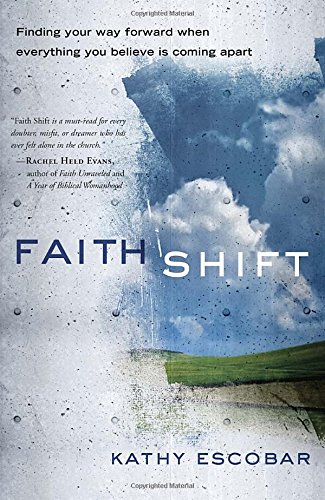
I have just finished reading Kathy Escobar’s new book Faith Shift. It is a great read particularly for those who do not feel comfortable in their church or faith tradition.
Kathy points out that growth and change are natural parts of our relationship with God. She helps us to understand and feel comfortable with being spiritual refugees, unpacking the stages most of us experience as we question, let go of and hopefully reform our faith. She talks about fusing, shifting, unravelling, severing,returning and ongoing rebuilding, sharing stories and practical insights that can help all of us move onward in our spiritual journeys.
As I reflected on Kathy’s experiences, I realized that faith shifting has been a way of life for me. I embraced the charismatic movement in Australia, unravelled in the refugee camps in Thailand and have rebuilt numerous times through the exploration of new streams of faith and spiritual life.
Every time I am confronted with a new injustice, or a new faith perspective, I start to faith shift again. Each time I find God unveils a new aspect of Godself and my image of God shimmers with new vibrancy.
As Kathy says at the end of her book:
The path for spiritual refugees like us rarely leads back to where we were. Usually it takes us around the next corner, and the next, further and further into the unknown, into diversity, mystery and freedom. (200)
That is certainly my experience. Learning to trust the path ahead even though we are not sure where it will take us is scary, but it is also exciting, because it does lead us toward a bigger, better relationship with God, others and ourselves. It opens up for us a greater understanding of a God who is far bigger and better than we can ever imagine.
Thank you Kathy for vulnerability and willingness to share honestly your struggles and journey. It has blessed me and I am sure will bless many others too.
For more information on the book check out this great interview Jamie Arpin-Ricci did with Kathy.

2 comments
Confession #1: I haven’t read the book. My anxiety as one who deconstructed every aspect of my Christian belief system in order to consider every aspect of it, was that one early discovery revealed that I was centre stage of my personal faith story and journey. My greatest and most liberating discovery was that God was the one who was centre stage – hence none of it was about me: how refreshing! My personal faith story was in fact an expression of the unversal faith story running through all of history.
It explained for me why so much of the Christian adventure I had encountered through the Evangelical and Charismatic UK movements (I worked in the past with Youth for Christ and the Evangelical Alliance UK, as well as led a Church for 21 years) was primarily about creating an alternative reality, one that reinforced itself through a sub culture of platforms, events, non profit organisations, courses, publications and self reflective music. It was in fact a construct built of sand on sand, or a mirage offering the hope of nourishment to those lost in the desert.
The blame for this certainly might be laid at the feet of the church, if in fact I wasn’t both a net contributer to that ‘church’. One lesson was that most deconstructionists created a nemesis, called church, to process their own angst. Of course, Church is captured in the Mystery of God, the Trinity, and with God as first cause and final end, can only be Church in as far as it itself offers everyone the Sacrament of Salvation.
This issue is less about Church as such and far more about the perennial unraveling of the individual psyche and our contemporary love affair with ourselves and eternal commitment to self help and self understanding. Often framed as ‘spirituality’, I think it reflects more our loss of focus and a retreat into my own ego as the measure of all things. The journey proves satisfying since it nurtures ‘ME’ and therefore I ‘feel’ so much better about ‘MY-SELF’.
I agree that ‘oughts’ and ‘shoulds’ are to be denounced and resisted. Yet, we are the ones who seek to embrace those in all of life; ‘I should be pain free’, ‘I ought to be paid appropriately’, ‘I should have a roof over my head’, I ought to be able to have a safe and secure retirement’. Perhaps for me it is a deconstruction of the ‘shoulds’ and ‘oughts’ we are nurtured on from the moment of our birth, and ones that owe as much to the social, political and economic constructs within which we attempt to live, constructs we then build into the ‘churches’ we establish only to ‘deconstruct’ as the angst is only briefly suppressed in a broef period of self indulgent satisfaction. We deconstruct church because the fall out is manageable and maintains a conversation in a small ‘religious minded’ minority within developed social constructs. I trust Ms Escobar, and others, can also deconstruct the much larger paradigm that demands our loyalty and write powerful critiques – something I have deeply appreciated about Tom Sine’s writings which first impacted me so powerfully when I first read his ‘Mustard Seed Conspiracy’ at University.
Just wanting to keep alive the essential conversation Ms Escobar has added her voice to through her book, the reviews of which in the internet I have enjoyed.
Thanks for this very thoughtful response. This is such an important discussion these days as so many of us are finding the liberation of moving outside the spiritual boxes in which we grew up. “My personal faith story was in fact an expression of the universal faith story running through all of history.” What a great thought. If we place God centre stage everything changes.